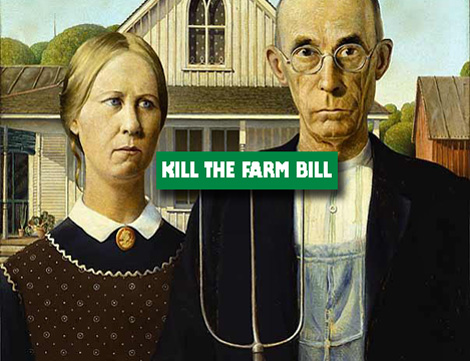Last week, the House passed the so-called “farm bill,” sending $956.4 billion in new spending to the Senate for approval.
Videos By Rare
To some, the bill’s passage was a welcome sign that Congress is finally working together. As Molly Ball argued in The Atlantic, the farm bill’s passage is “the latest sign that Congress has rediscovered its ability to get things done,” an indication Congress is “getting better.”
Misguided optimism aside, the farm bill is a stark example of what’s wrong with Congress.
It always has been.
The farm bill began like so many other permanent government programs: it was supposed to be temporary. In 1933, Congress passed the Agriculture Adjustment Act as part of the New Deal and included a small nutrition portion, the precursor to the food stamps program (which has since come to represent three-fourths of the bill).
In 1938, Congress permanently established the AAA and its related laws, and the farm bill as we know it today was born.
Since then, Congress has usually reauthorized the bill every five years, with few reforms and always including significant growth in the size and scope. The bill has evolved from being temporary support for struggling families to an exclusive bonus club for some of the nation’s wealthiest individuals – with a hefty welfare program that has nothing to do with farming tacked on to boot.
That’s right. The wealthiest farmers often get the most subsidies. About 62% of farmers don’t even receive any subsidies (According to a recent study, 10 percent of farmers who got subsidies took in three-fourths of total benefits.) The $93 billion food stamps portion, too, is fraught with fraud and, at risk of sounding uncharitable, spends billions in taxpayer money on items only tenuously related to “nutrition.”
But these very real reasons for reform haven’t led to many changes over the years.
Why?
It’s sad, but simple. Many Republican districts benefit from farm subsidies, and many Democratic districts benefit from entitlement programs.
As Martha Noble of the National Sustainable Agriculture Coalition said, “even representatives (from rural farming areas) who might not like idea of welfare, or whatever, were willing to hold their noses and vote for it, because they knew the urban folks would hold (their) nose and vote for price supports for farmers.”
Yes, “compromise” in the farm bill amounts to little more than “I’ll vote for your spending, since you’ll vote for mine.”
This year, though, the House briefly changed course and rejected the farm bill outright. Unsurprisingly, this good news didn’t last, as proponents quickly reorganized and pushed through another bill that offered conservatives the token of separating the farm and food stamps portions.
But this was worse in several ways, including making permanent several terrible programs, and spending more than President Obama or the Democratic-controlled Senate had requested. And of course, the conference committee reestablished the food stamps portion, as expected.
Similarly, while this most recent bill also included modest reforms such as ending direct payments to farmers, making minor cuts to food stamp spending, and allowing industrial hemp for certain research purposes, these minor tweaks were far outweighed by this overall, very bad bill.
Like too much legislation, the farm bill promises negligible savings over time while enacting massive spending today. $8 billion in cuts to the food stamp program might sound significant – if you forget the program spends nearly 12 times that much. $6 billion in savings or the promise of $16.6 billion in spending cuts over the decade pale in the face of today’s $956.4 billion price tag.
As with the recent Ryan-Murray budget deal, where Republicans got more plentiful Pentagon spending and Democrats got more entitlement spending with precious few reforms, the latest edition of the farm bill serves not as an example of working together to produce the “common good,” but rather a cautionary tale of how difficult it can be to end bad legislation when both sides get to hang onto their own sacred cows.
The farm bill is not an example of Congress finally “working,” but of broken, irresponsible and incorrigible government.

